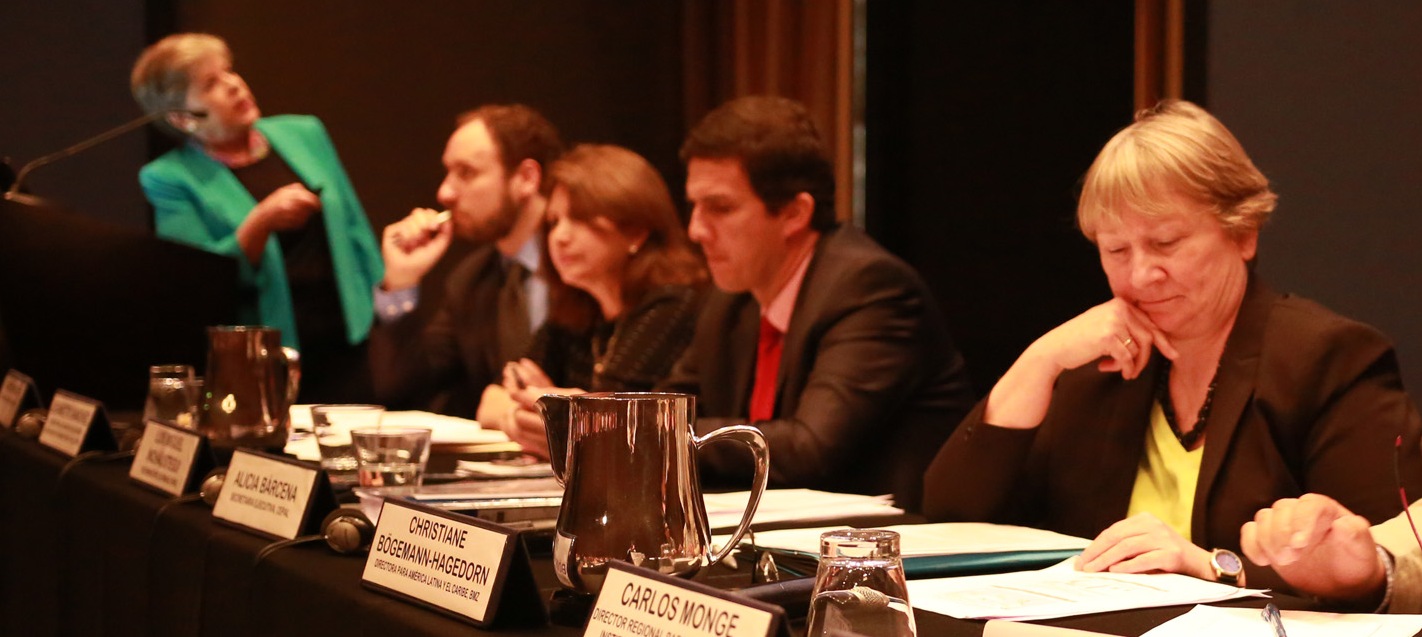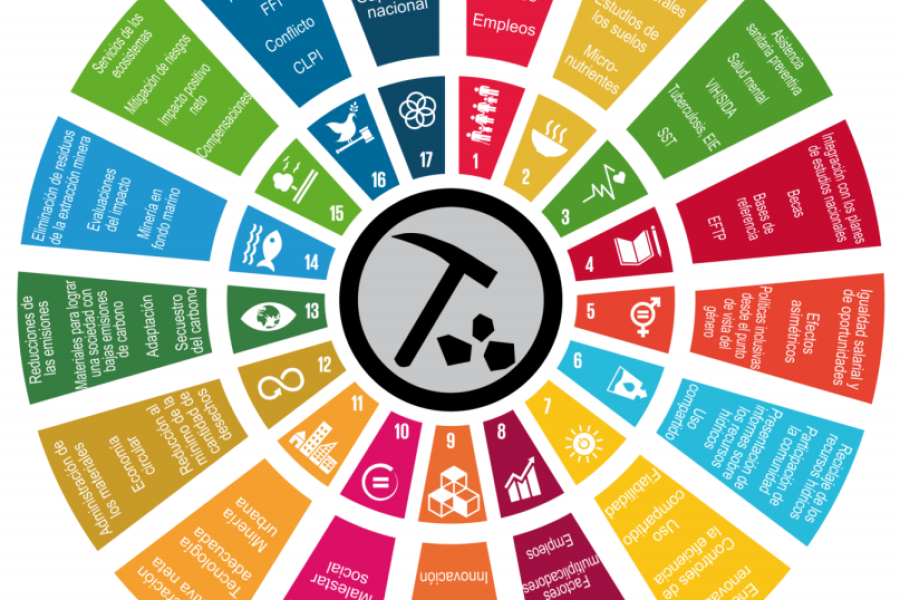Authorities and Experts from Various Latin American and Caribbean Countries Stress Importance of Mining Governance to Contribute to the Sustainability of Development and an Environmental Big Push
Work area(s)
ECLAC’s Executive Secretary, Alicia Bárcena, gave a presentation at a high-level seminar on mining opportunities and challenges in the region, which was held in the framework of the cooperation program with Germany’s BMZ.

Authorities and experts gathered in Lima, Peru this Monday, November 19, stressed the importance of having an adequate governance of natural resources, especially mining ones, that contributes to moving toward more sustainable development with an environmental big push in the region.
The high-level seminar Mining in Latin America and the Caribbean: Interdependencies, Challenges and Opportunities for Sustainable Development, was organized by ECLAC in conjunction with German cooperation – through Christiane Bögemann-Hagedorn, Deputy Director General for Latin America of the Federal Ministry for Economic Cooperation and Development (BMZ) – and with the support of the Peruvian Ministry of Energy and Mines. The event was inaugurated by Luis Miguel Incháustegui, Peru’s Deputy Minister of Mining; Carolina Sánchez, Argentina’s Mining Policy Secretary and President of the Executive Committee of the Mines Ministries of the Americas Conference (CAMMA); Stefan Herzberg, German Ambassador in Peru; and Alicia Bárcena, Executive Secretary of the Economic Commission for Latin America and the Caribbean (ECLAC).
In his welcome remarks, Peru’s Deputy Minister of Mining, Luis Miguel Incháustegui, emphasized the importance of recognizing the challenge of resolving trust dilemmas between stakeholders linked to the mining sector, “a challenge that must be handled with cooperation, and in a sustainable way,” he said. He indicated that the prevailing spirit should be to make mining a competitive activity and one that contributes to inclusive development, in the framework of the United Nations’ 2030 Agenda.
Meanwhile, Carolina Sánchez stressed the need to improve society’s relationship to mining through work to lay the institutional foundations that would reflect all viewpoints. She also highlighted the need to improve communication to society, along with the fact that mining can be an invigorating force for aspects such as gender equity, the articulation of local value chains, and the training of human capital that contributes to mining projects not only with its labor but also with its creativity and innovation.
In his remarks, German Ambassador Stefan Herzberg promoted the notion of a partnership for sustainability, recognizing that countries such as his need natural and mining resources such as those produced in the Andean region, and they are betting on ties that go beyond trade and may be framed within the global sustainable development agenda.
At the seminar’s inauguration, Alicia Bárcena explained that Latin America and the Caribbean has abundant natural resources and accounts for a significant portion of mining reserves at a global level: 65% of lithium, 49% of silver, 44% of copper and 33% of tin. She indicated that historically this situation has defined the region’s specialization in primary product exports, which was further reinforced by the last boom in minerals prices (between 2002 and 2008). In this way, the region’s mining exports have consistently risen in terms of volume, reaching $170 billion dollars in 2017, which is equivalent to 17% of the value of its total goods shipments and to 8% of global minerals and metals exports (according to ECLAC’s recent annual report International Trade Outlook for Latin America and the Caribbean 2018).
The senior United Nations official added that while the resources that mining brought to the region supported fiscal accounts and foreign currency inflows to exporting countries, Latin America and the Caribbean has had difficulty converting bonanza periods for its natural resource exports into long-term economic development processes.
“There are still enormous challenges to tackle with regard to external vulnerability, environmental impacts and the need to invest mining revenue in human and productive capacities that contribute to these countries’ sustainable development,” Bárcena stated.
“That entails achieving effective governance regarding the ownership, appropriation, distribution and investment of mining revenue, which allows for transforming these strategic resources into another type of durable resource that is at the service of citizens and the sustainability of their economies,” she said.
In a subsequent keynote presentation, ECLAC’s top authority also indicated that the “supercycle” of commodities prices improved the terms of trade, increased exports, produced extraordinary revenue and invigorated economic growth, but it did not bring about the diversification of production in the region. In addition, the taxation of mining income has been insufficient to build lasting alternative capital and to attenuate external vulnerability; at the same time, mining activities foster a loss of natural heritage and endanger the region’s environmental sustainability. “That explains the importance of having mining governance to contribute to sustainability, structural change and equality in the framework of the 2030 Agenda,” she emphasized. “We must also build a new conversation between the State, the market and society that lays the groundwork for an effective governance of natural resources that is coherent with the commitments made to this Agenda globally.”
Bárcena explained that natural resources governance refers to the set of sovereign policies addressing the ownership of natural resources, the appropriation and distribution of productivity gains, and the compensation of costs. It requires public policies that involve regulatory, institutional and fiscal aspects along with strategic planning, administration and management of socio-environmental conflicts.
At the meeting, another keynote presentation was made by Christiane Bögemann-Hagedorn, BMZ’s Deputy Director General for Latin America, who relayed the perspective of German cooperation on these issues, where the emphasis lies in seeking points of convergence between economic activities as relevant as mining and the 17 Sustainable Development Goals (SDGs) and the imperative of leaving no one behind.
During her visit to Lima, ECLAC’s Executive Secretary, Alicia Bárcena, will also participate on Tuesday, November 20 in the IX Mines Ministries of the Americas Conference (CAMMA), where she will make a presentation about the state of mining in the region and the opportunities and challenges for more sustainable development.
Related content
Seminario "La minería en América Latina y el Caribe: interdependencias, desafíos y oportunidades para el desarrollo sostenible"
Palabras de Alicia Bárcena, Secretaria Ejecutiva de la CEPAL.
Gobernanza de los Recursos Naturales en América Latina y el Caribe para el desarrollo sostenible
Presentación de Alicia Bárcena, Secretaria Ejecutiva de la CEPAL, en el seminario "La minería en América Latina y el Caribe: interdependencias, desafíos y oportunidades para el desarrollo sostenible"…

La minería en América Latina y el Caribe: interdependencias, desafíos y oportunidades para el desarrollo sostenible
Actividad desarrollada bajo el Programa “Cooperación Regional para la Gestión Sustentable de los Recursos Mineros en los países Andinos” y en coordinación con la Conferencia de Ministros de Minería…

Mining Ministries of the Americas Meet in Peru to Address the Sector’s Challenges and Opportunities with regard to Sustainable Development
ECLAC’s Executive Secretary, Alicia Bárcena, was one of the main speakers at the IX Annual CAMMA Conference, which was held in Lima.
